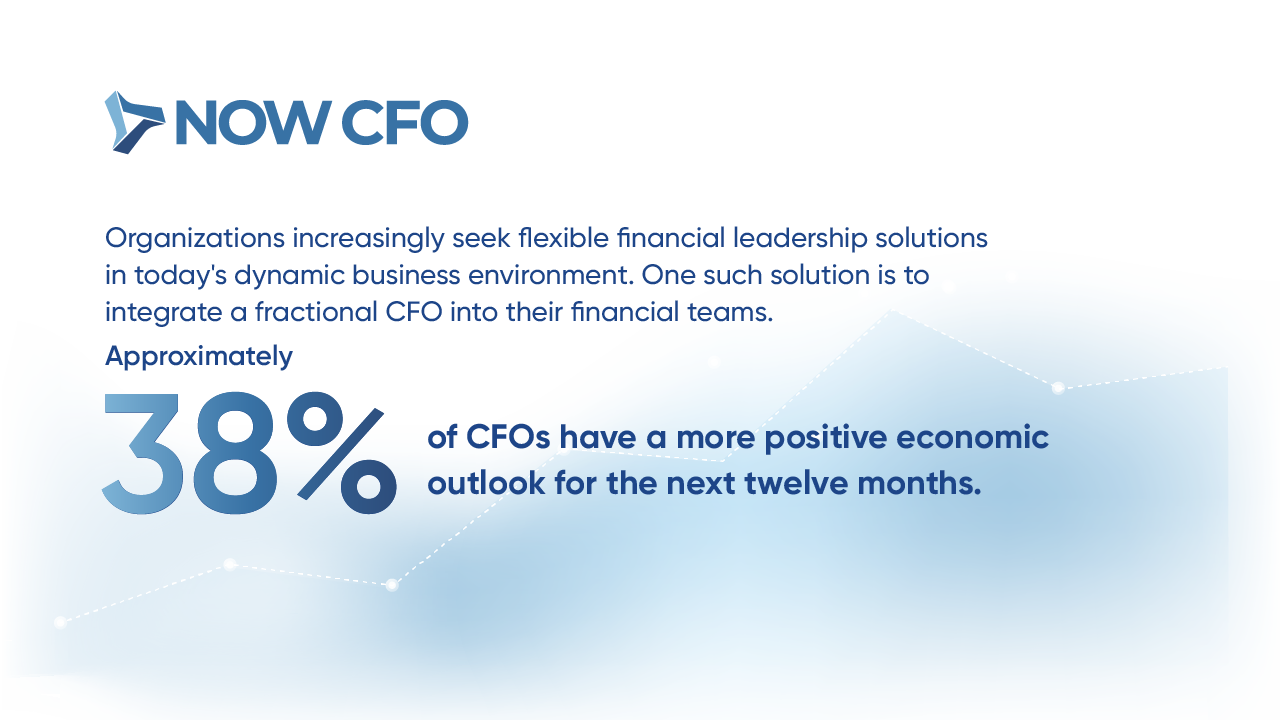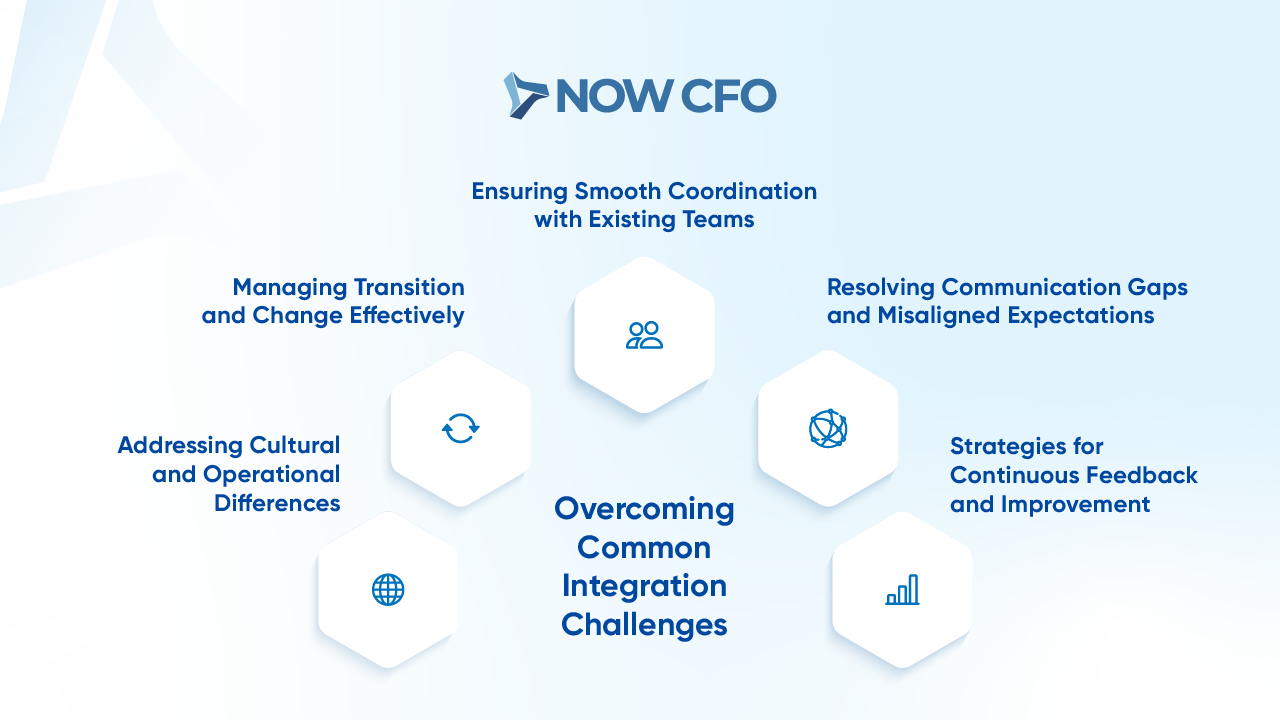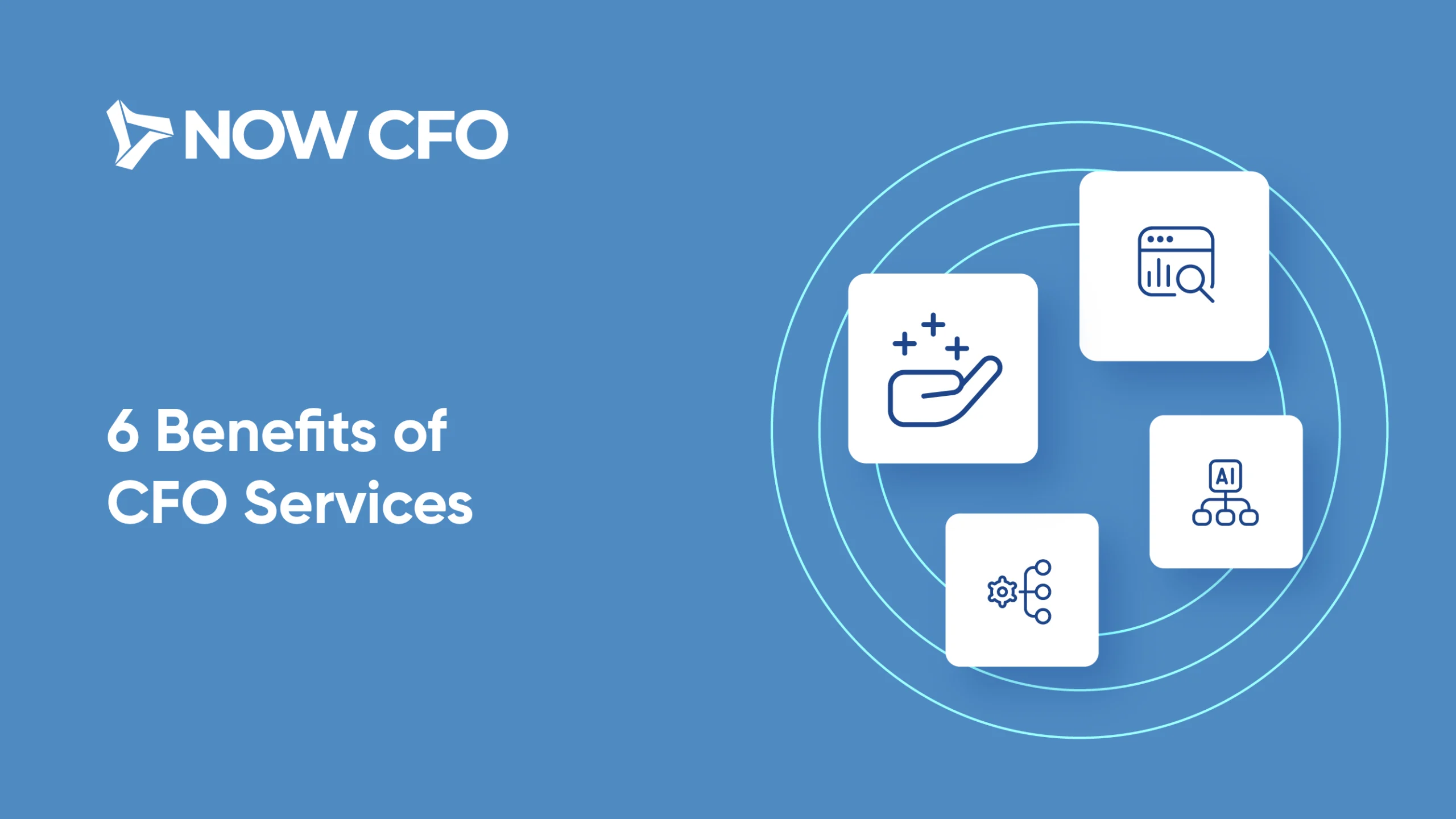
Integrating a fractional CFO into your financial team has become an increasingly popular strategy. Notably, from 2019 to 2020, there was a 27% increase in CFO resignations, leading many companies to explore fractional or part-time CFOs as a cost-effective alternative.
This approach offers businesses access to high-level financial expertise without the commitment of a full-time position.
Introduction to Fractional CFO Integration
Organizations increasingly seek flexible financial leadership solutions in today’s dynamic business environment. One such solution is to integrate a fractional CFO into their financial teams. Approximately 38% of CFOs have a more positive economic outlook for the next twelve months.

This model will enable businesses to tailor financial leadership to their needs and budgets. Consequently, this strategy offers a cost-effective alternative to traditional CFO roles, allowing companies to navigate complex financial landscapes swiftly.
Overview of Fractional CFO Services and Their Value
A fractional CFO provides specialized financial management services on a part-time or project basis. This role encompasses strategic planning, financial reporting, risk management, and capital optimization. For instance, hiring a CFO as a service might assist in preparing for audits or restructuring financial processes.
This flexibility allows businesses to access top-tier financial expertise without the overhead of a full-time position. Moreover, companies can scale services up or down based on their evolving needs. This adaptability ensures financial strategies align with current business objectives, enhancing operational efficiency.
The Growing Trend of Outsourced Financial Leadership
The trend toward outsourced financial leadership is gaining momentum across various industries. Businesses are increasingly recognizing the benefits of outsourcing financial functions to specialized professionals. The need for cost reduction, access to advanced financial technologies, and the desire for strategic agility drives this shift.
For example, outsourcing can provide access to superior knowledge and capabilities, improving efficiency. As a result, companies can focus on core competencies while leveraging external expertise for financial management.
How Integration Enhances Strategic Financial Management
Integrating a fractional CFO into a company’s financial team can significantly enhance strategic financial management. These professionals bring a wealth of experience and an objective viewpoint, enabling more informed decision-making. They can identify inefficiencies, implement best practices, and align financial strategies with business goals.
For instance, a fractional CFO might focus on short-term objectives such as preparing for audits or supporting mergers and acquisitions, thereby adding value to the organization. This targeted approach ensures that financial operations are efficient and strategically aligned with the company’s long-term vision.
The Role of NOW CFO in Providing Expert Fractional CFO Solutions
NOW CFO delivers expert fractional CFO solutions tailored to each client’s unique needs. By offering financial reporting, budgeting, and strategic planning services, NOW CFO enables businesses to access high-caliber financial expertise flexibly.
Our team of seasoned professionals collaborates closely with internal teams to ensure seamless integration and alignment with organizational objectives. This partnership approach ensures that financial strategies are customized to each client’s circumstances, fostering sustainable growth and profitability.
Objectives and Benefits of a Seamless Integration
Achieving a seamless integration of a fractional CFO into an existing financial team aims to enhance financial oversight, improve strategic planning, and bolster overall business performance. Benefits include access to specialized expertise, cost savings compared to hiring a full-time CFO, and increased flexibility in financial management.
For example, outsourcing financial leadership can improve productivity and innovation. This integration allows businesses to adapt quickly to market changes, optimize financial processes, and make data-driven decisions that drive success.
Learn More: Benefits of Hiring a Fractional CFO
Understanding the Role of a Fractional CFO
Companies often seek flexible financial leadership to navigate complex challenges in today’s dynamic business environment. One such solution is integrating a fractional CFO into the organization.
Defining the Fractional CFO’s Responsibilities
A fractional CFO is a financial expert who provides part-time or contractual services. Their key responsibilities includes:
- Strategic Planning: Developing long-term financial strategies aligned with company goals.
- Financial Reporting: Ensuring accurate and timely financial statements.
- Cash Flow Management: Monitoring and optimizing cash flow to maintain liquidity.
- Risk Management: Identifying and mitigating financial risks.
- Budgeting: Creating and managing budgets to control expenditures.
A fractional CFO enhances the company’s financial health and supports informed decision-making by focusing on these areas.
Key Differences Between Fractional and Full-Time CFO Roles
While both roles aim to strengthen financial management, notable differences exist:
- Employment Basis: A full-time CFO is a permanent executive, whereas a fractional CFO works part-time or on specific projects.
- Cost Implications: Employing a full-time CFO entails a significant salary and benefits package. In contrast, a fractional CFO offers expertise at a fraction of the cost, making it a cost-effective solution for many businesses.
- Engagement Scope: Full-time CFOs are deeply involved in daily operations, while fractional CFOs focus on high-impact areas, providing targeted expertise where it’s most needed.
Strategic Advantages of a Fractional CFO
Studies show that companies can save up to 60% if they outsource their internal accounting functions. Integrating a fractional CFO presents several strategic benefits:
- Flexibility: Businesses can adjust the level of financial expertise based on current needs, scaling services up or down as required.
- Diverse Experience: Fractional CFOs often work across various industries, bringing knowledge and innovative solutions.
- Objective Perspective: As external consultants, they provide unbiased insights and facilitate impartial assessments of financial strategies and operations.
How a Fractional CFO Complements In-House Teams
A fractional CFO collaborates effectively with existing staff by:
- Enhancing Skill Sets: Introducing specialized knowledge that may be lacking internally.
- Mentoring: Providing guidance and training to elevate the in-house team’s capabilities.
- Project Leadership: Spearheading critical financial initiatives, such as system implementations or capital-raising efforts.
The Impact on Overall Financial Performance
Engaging a fractional CFO can lead to significant improvements in financial performance:
- Enhanced Profitability: Through meticulous financial analysis and strategy development, they identify opportunities to increase profits.
- Improved Cash Flow: By optimizing cash management practices, they ensure sufficient liquidity for operations and growth.
- Risk Reduction: Implementing robust risk management frameworks minimizes potential financial pitfalls.
These contributions strengthen the company’s financial foundation, positioning it for sustained success.
Learn More: Fractional CFO Services
Best Practices for Fractional CFO Onboarding
Integrating a fractional CFO into your financial team requires careful planning and execution to ensure seamless collaboration and optimal outcomes. By following these best practices, organizations can effectively harness the expertise of a fractional CFO.
Preparing Your Financial Team for a New Leadership Role
Nearly 30% of U.S. firms report that their employees are “maxed out,” working at full capacity, with 60% looking to hire. Before introducing a fractional CFO, it’s essential to prepare your existing financial team:
- Communicate the Benefits: Explain how the fractional CFO’s expertise will enhance team performance and contribute to organizational goals.
- Foster an Open Environment: Encourage team members to express concerns and ask questions, promoting a culture of transparency.
- Provide Training: Offer workshops or sessions to acquaint the team with the fractional CFO’s role and responsibilities.
By taking these steps, you lay the groundwork for a smooth transition and collaboration.
Establishing Clear Roles and Expectations
Defining the scope of the fractional CFO’s role is crucial:
- Outline Responsibilities: Specify financial reporting, strategic planning, and risk management tasks.
- Set Boundaries: Clarify decision-making authority to prevent overlaps with existing roles.
- Agree on Objectives: Establish measurable goals to align efforts and assess performance.
Clear delineation of roles ensures accountability and minimizes potential conflicts.
Creating Effective Communication Channels
Effective communication is vital for integrating a fractional CFO:
- Regular Meetings: Schedule consistent check-ins to discuss progress, challenges, and updates.
- Utilize Collaboration Tools: Implement platforms like Slack or Microsoft Teams to facilitate real-time communication.
- Document Processes: Maintain records of discussions and decisions to ensure alignment.
These practices promote transparency and keep all stakeholders informed.
Aligning Strategic Goals and Financial Reporting Processes
To maximize the impact of a fractional CFO, align strategic objectives with financial reporting:
- Collaborative Planning: Involve the fractional CFO in strategic discussions to ensure financial insights inform decision-making.
- Standardize Reporting: To maintain consistency, develop uniform templates and schedules for financial reports.
- Integrate KPIs: Ensure key performance indicators reflect strategic goals and financial metrics.
This alignment facilitates informed decisions and cohesive strategies.
Setting Up Performance Metrics and KPIs for Success
Establishing clear metrics is essential to evaluate the fractional CFO’s effectiveness:
- Define Financial Targets: Set specific goals for revenue growth, cost reduction, or profitability.
- Monitor Operational Efficiency: Assess process improvements, such as faster reporting cycles or enhanced accuracy.
- Evaluate Strategic Contributions: Measure the impact on long-term initiatives, like market expansion or investment returns.
Regularly reviewing these KPIs ensures continuous improvement and goal attainment.
Leveraging Technology to Support Seamless Collaboration
Utilizing technology enhances collaboration with a fractional CFO:
- Adopt Cloud-Based Systems: Ensure accessibility to financial data from any location.
- Implement Project Management Tools: Use platforms like Asana or Trello to track tasks and deadlines.
- Secure Data Sharing: Employ encrypted file-sharing services to protect sensitive information.
These technological solutions facilitate efficient workflows and secure communication.
Overcoming Common Integration Challenges
Integrating a fractional CFO into your organization can present various challenges. However, proactive strategies can effectively manage these obstacles to ensure a seamless transition and optimal collaboration.

Addressing Cultural and Operational Differences
When introducing a fractional CFO into your team, addressing potential cultural and operational differences is crucial. As external consultants, fractional CFOs may face challenges aligning with the company’s existing culture and processes.
Organizations should facilitate a smooth onboarding process to mitigate this and foster collaboration between the fractional CFO and existing staff. This approach ensures alignment with the company’s goals and objectives.
Managing Transition and Change Effectively
Effectively managing the transition to include a fractional CFO requires clear communication and structured planning. Establishing clear terms for the fractional CFO’s role, duration of engagement, and expectations is essential.
This includes defining their availability, responsibilities, and how progress will be measured. Having clear agreements helps mitigate potential misunderstandings and facilitates a smoother transition.
Ensuring Smooth Coordination with Existing Teams
A collaborative environment ensures smooth coordination between the fractional CFO and existing teams. Encouraging team-building activities and open communication can build trust and rapport between the fractional CFO and existing staff.
Recognizing and valuing an interim CFO’s diverse perspectives and expertise can enhance problem-solving and drive innovation within the financial team.
Resolving Communication Gaps and Misaligned Expectations
Communication gaps and misaligned expectations can hinder the effectiveness of a fractional CFO. To address this, implementing effective communication strategies is essential.
For instance, management accountants can employ key communication strategies to enhance their effectiveness in cross-functional teams, ultimately contributing to the organization’s overall success.
Strategies for Continuous Feedback and Improvement
Implementing continuous feedback mechanisms is vital for the ongoing success of integrating a fractional CFO. Regular performance evaluations and feedback loops ensure that the fractional CFO’s efforts align with organizational goals.
Establishing KPIs and regularly assessing progress against these metrics fosters accountability and promotes ongoing improvement in financial management practices.
How NOW CFO Supports Outsourced CFO Integration
Integrating a fractional CFO into your organization can be a transformative step toward enhanced financial management. NOW CFO specializes in facilitating this integration through tailored services designed to meet your business’s unique needs.
Customized Solutions Tailored to Your Business Needs
Recognizing that each business operates within its challenges and goals, NOW CFO offers bespoke financial solutions. By conducting comprehensive assessments, we develop strategies aligning with your company’s objectives, ensuring that the fractional CFO services are relevant and practical.
Access to Experienced and Qualified Fractional CFOs
NOW CFO prides itself on a team of seasoned professionals with diverse industry experience. Our fractional CFOs bring a wealth of knowledge, enabling them to address complex financial issues adeptly. This access ensures that your organization benefits from high-caliber expertise without the commitment of a full-time hire.
Proven Processes for Seamless Onboarding and Integration
To facilitate a smooth transition, NOW CFO employs established onboarding protocols. These processes are designed to integrate the fractional CFO seamlessly into your existing team, minimizing disruptions and fostering immediate collaboration.
Ongoing Support and Strategic Financial Guidance
Beyond initial integration, NOW CFO provides continuous support to adapt to your evolving business needs. Our part-time CFOs offer strategic financial guidance, assisting in budgeting, forecasting, and risk management. This ongoing partnership ensures that your financial strategies remain agile and responsive to market changes.
Success Stories and Client Satisfaction Metrics
NOW CFO’s commitment to excellence is reflected in numerous success stories and high client satisfaction rates. For instance, we have assisted companies in streamlining operations, leading to significant cost savings and improved financial clarity.
Enhancing Long-Term Financial Leadership and Growth
By leveraging NOW CFO’s expertise, businesses can cultivate robust financial leadership that drives sustainable growth. Our fractional CFOs address immediate financial concerns and lay the groundwork for long-term success, ensuring your organization is well-positioned in a competitive marketplace.
Conclusion
By embracing the benefits of virtual CFO integration, your organization can achieve enhanced financial oversight and strategic growth. To explore how this integration can be tailored to your specific needs, please feel free to contact our team of experts. Schedule a free consultation today to discover the transformative impact a fractional CFO can have on your business.














